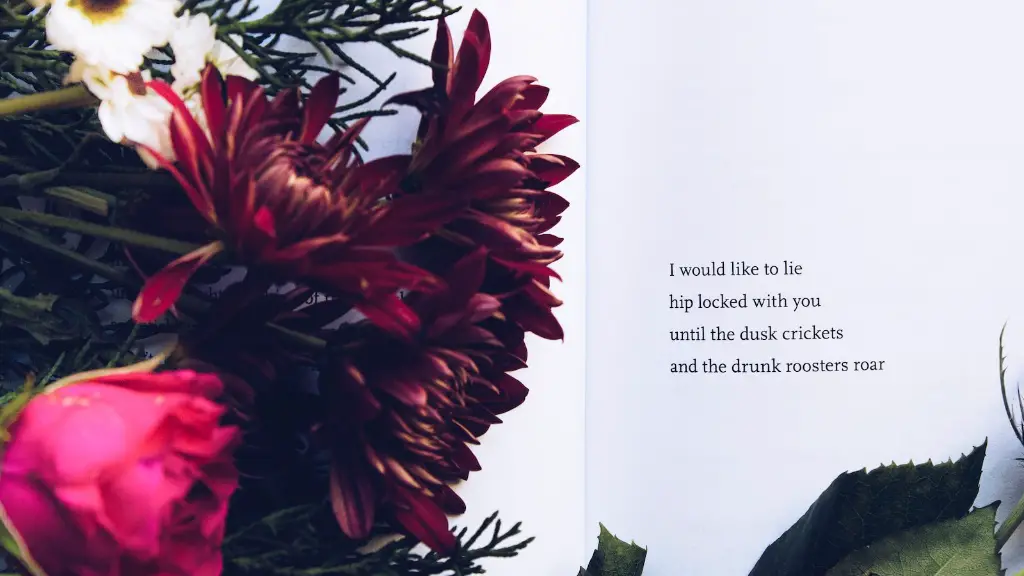What is Poetry?
Poetry is an art form in which intense emotion, abstraction, and diversity of expression are conveyed through the use of language. It can range in form and style from structured rhyme and rhythm to untamed free verse. Poetry, of course, predates the written record, but the earliest written records of poetry date back to around 2700 B.C. The oldest known poem, the Epic of Gilgamesh, is most likely the result of a collective effort.
Types of Poetry
Poetry is a versatile genre, and different types of poetry, serve different purposes. Examples of some popular forms of poetry include ballads, sonnets, and epics. Ballads are narrative poems that generally tell stories of love and loss; sonnets are structured lyric poems, typically about 14 lines in length; and epics are long, narrative poems that detail heroic deeds or events.
Who Writes Poetry?
There is no definitive answer to this question as poets come from all walks of life, cultures, nationalities, and backgrounds. Poets can be professional writers, students, students of language and literature, or simply passionate readers and writers who enjoy expressing themselves through poetry. Furthermore, poetry writing is open to anyone, regardless of experience level, as there is no one, “right” way to write poetry.
Critically Acclaimed Poets
Throughout history and across cultures, poets have set themselves apart for their skill and mastery of the written word. According to the New York Times, some of the world’s most acclaimed poets include Emily Dickinson, T.S. Eliot, Robert Frost, Langston Hughes, Edna St. Vincent Millay, and William Wordsworth.
Famous Living Poets
Today’s poetry landscape is vast, and it is populated by some immensely popular, critically acclaimed poets. Examples of some contemporary, famous poets include Billy Collins, Mary Oliver, Richard Blanco, Naomi Shihab Nye, and Juan Felipe Herrera. In addition, a great many poets are publishing and performing their works independently, or through small presses and niche publications.
Writing Poetry
Writing poetry can be both deeply satisfying and cathartic. It allows a writer to express his or her emotions and views in a creatively satisfying way. For the budding poet, the ultimate goal of creating a poem may center around the concept of publication, contest wins, and performance opportunities; however, the immediate satisfaction derived from writing and subsequent editing of a poem can be its own reward.
Developing as a Poet
In order to develop as a poet, it is important to practice writing regularly, as well as to be open to constructive criticism. Writing in a variety of forms and styles that go beyond one’s comfort zone can be especially helpful, as can conducting research into different poetry styles and forms. Additionally, many universities, colleges, and other organizations host poetry workshops and support poetry slams, which can offer a great opportunity to connect with like-minded peers and hone one’s craft.
Getting Published
Once a poet has developed their style and gained some confidence in their abilities, the next step may be to attempt to get their work published. This can be a daunting step, as the poem must first be accepted by an editor. Poetry is often submitted through a combination of open and close reading submission call systems; however, some poets may prefer to self-publish, or to put together an online portfolio that can be shared and promoted.
Promoting Poetry
Of course, publication is only one aspect of a poet’s total exposure. Many successful poets today promote their works through social media, book tours, readings, and other events. Furthermore, many poets choose to maintain an online presence that allows readers to stay up to date with their latest works and upcoming events. Additionally, poets sometimes work with agents and publishers to market their work to obtain favorable exposure.
Poetry in Education
While it may not be for everyone, poetry can be a powerful and informative tool for engaging students in their classrooms. Studies have shown that teaching poetry to students can help improve their writing skills and literacy, as the repetitive structure and creative story-telling can help simplify complex concepts and make them easier to understand. Through poetry, students can gain an increased understanding and appreciation for the written word, which can enable them to become better writers and improved communicators.
The Impact of Poetry
In addition to its educational value, poetry can have a profound emotional impact on readers. Poetry is, in the end, linguistic expression, and the very act of expressing emotions through the written word can be life-changing. It can help individuals develop empathy and express their pain and joy in a productive, creative manner. Additionally, poetry can help heighten emotion, foster self-reflection, and provide catharsis and closure, all of which are essential to self-development and growth.
Physical and Mental Benefits
Research has shown that writing poetry can have a positive effect on both physical and mental health. Writing provides an outlet for stress and anxiety, while also promoting creativity and self-reflection. Furthermore, physical benefits can arise from the added mental stimulation of writing, and from the emotional satisfaction derived from the creative process. Poetry can also be used to help individuals cope with trauma and grief, as well as to work through difficult emotions and issues.
Why Write Poetry?
Writing poetry is a rewarding pursuit that can demonstrate the power of literary expression. Poetry is a uniquely emotive and powerful art form, and it is accessible to all who are interested in pursuing it. Writing poetry can provide a much-needed outlet for emotions, and it offers an opportunity for creative growth and exploration. Thus, it is no wonder so many turn to the written word to explore their innermost feelings and thoughts.



